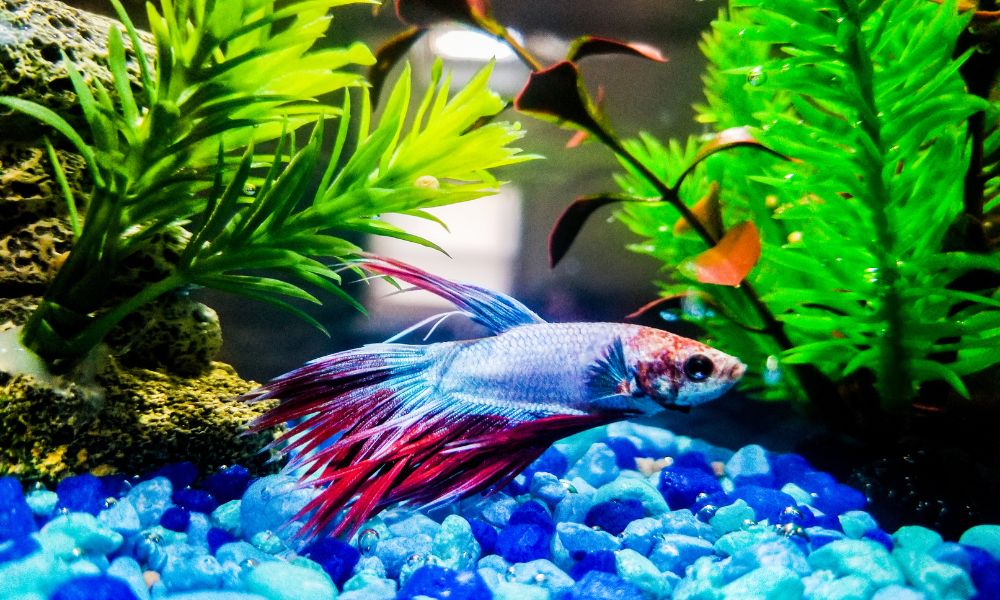In this article Show
As an experienced fishkeeper, I’ve come to appreciate the unique characteristics and behaviors of betta fish, often known for their vibrant colors and elegant fins. Today, we’re focusing on a common concern among betta fish owners: why does a betta fish keep hitting the tank?
This behavior, while perplexing, is not uncommon. It’s important to understand the reasons behind it to ensure the well-being of your aquatic companion. In this article, we’ll explore the potential causes of this behavior and provide practical solutions to create a healthier environment for your betta.
Whether you’re a seasoned betta fish owner or new to the aquarium hobby, this guide aims to offer clear, professional advice in a simple and approachable manner. Let’s embark on this journey to better understand our friends and enhance their lives within our home aquariums.
Why Does My Betta Fish Keep Hitting The Tank?
The reason why betta fish hit their tank often stems from stress, environmental reflections, boredom, or underlying health issues. Addressing these concerns involves optimizing the tank environment, providing enrichment, and ensuring proper water quality. Regular tank maintenance, reducing reflections, and adding stimulating features can greatly reduce this behavior. If persistent tank hitting occurs, consulting with a vet experienced in betta fish health is advised for a comprehensive health check.
Common Reasons Why Betta Fish Hit the Tank
1. Stress
Betta fish are sensitive to their environment. Factors like loud noises, frequent tank changes, or aggressive tank mates can cause stress, leading them to hit the tank walls. It’s essential to maintain a calm and stable environment for your betta.
2. Reflection
Bettas are territorial and may mistake their reflection for another fish, causing them to strike the glass. Reducing reflections with appropriate lighting and background can help alleviate this issue.
3. Boredom
A lack of stimulation can lead to boredom in betta fish. Without plants, hiding places, or room to swim, bettas might hit the tank out of frustration or boredom. Enriching the tank with decorations and space for exploration is beneficial.
4. Health Issues
Sometimes, hitting the tank can be a sign of health problems like parasites or swim bladder disease. Monitoring your betta for other symptoms and consulting a vet if necessary is important for their well-being.
Understanding these factors is key to ensuring a healthy and happy environment for your betta fish, preventing distress, and promoting a long, fulfilling life in your care.

Health Concerns Associated with Tank Hitting
Consistent hitting against the tank can lead to several health concerns for betta fish. Injuries such as scale loss, damaged fins, or even bruises can occur. Repeated impacts can also lead to stress, weakening their immune system and making them more susceptible to diseases like fin rot or infections.
If you notice any physical injuries, changes in behavior, or signs of illness like lethargy, loss of appetite, or unusual swimming patterns, it’s crucial to consult with a vet specialized in aquarium fish care.
Early intervention can prevent more severe health issues and ensure the well-being of your betta. Remember, a healthy betta is an active and vibrant companion, so keeping an eye on their health is an integral part of responsible fish care.
Preventive Measures and Solutions
To prevent betta fish from hitting the tank, consider these practical tips:
- Optimize Tank Environment: Ensure your betta’s tank is of adequate size, ideally at least 5 gallons. A spacious environment reduces stress and aggressive behavior.
- Reduce Reflections: Adjust lighting and tank backgrounds to minimize reflections inside the tank, which can cause bettas to feel threatened and react.
- Enrichment Activities: Introduce live plants, caves, or floating toys to provide stimulation and hiding places. This enrichment can alleviate boredom and reduce aggressive behavior towards the tank walls.
- Maintain Water Quality: Regularly check and maintain water parameters like pH, temperature, and cleanliness. Good water quality is essential for reducing stress and keeping your betta healthy.
- Avoid Overcrowding: Too many fish or incompatible species in the same tank can lead to territorial disputes. Ensure your betta has enough space and compatible tank mates.
Implementing these measures can significantly reduce the likelihood of your betta fish hitting the tank, leading to a more peaceful and healthy life for your aquatic pet.










